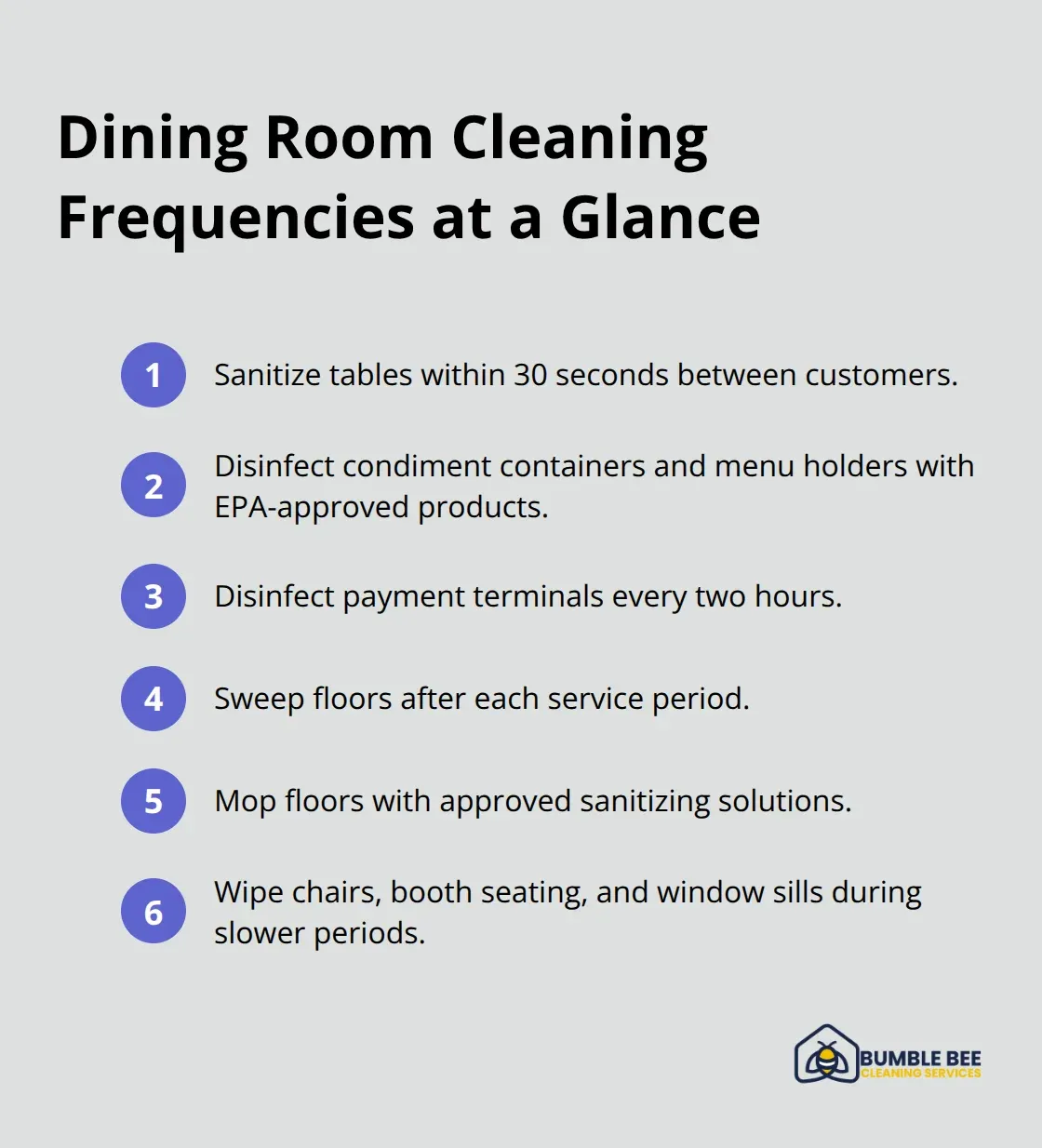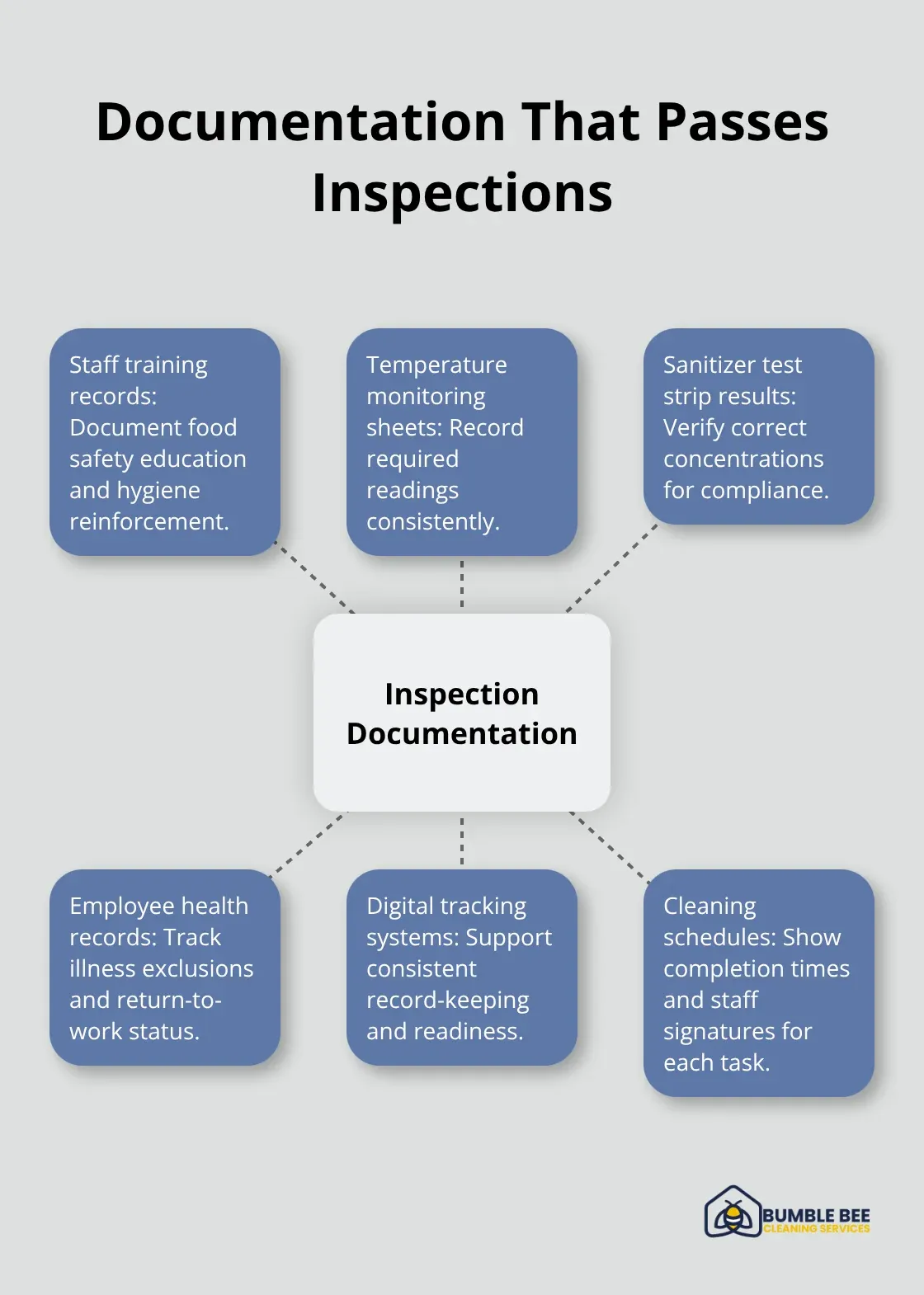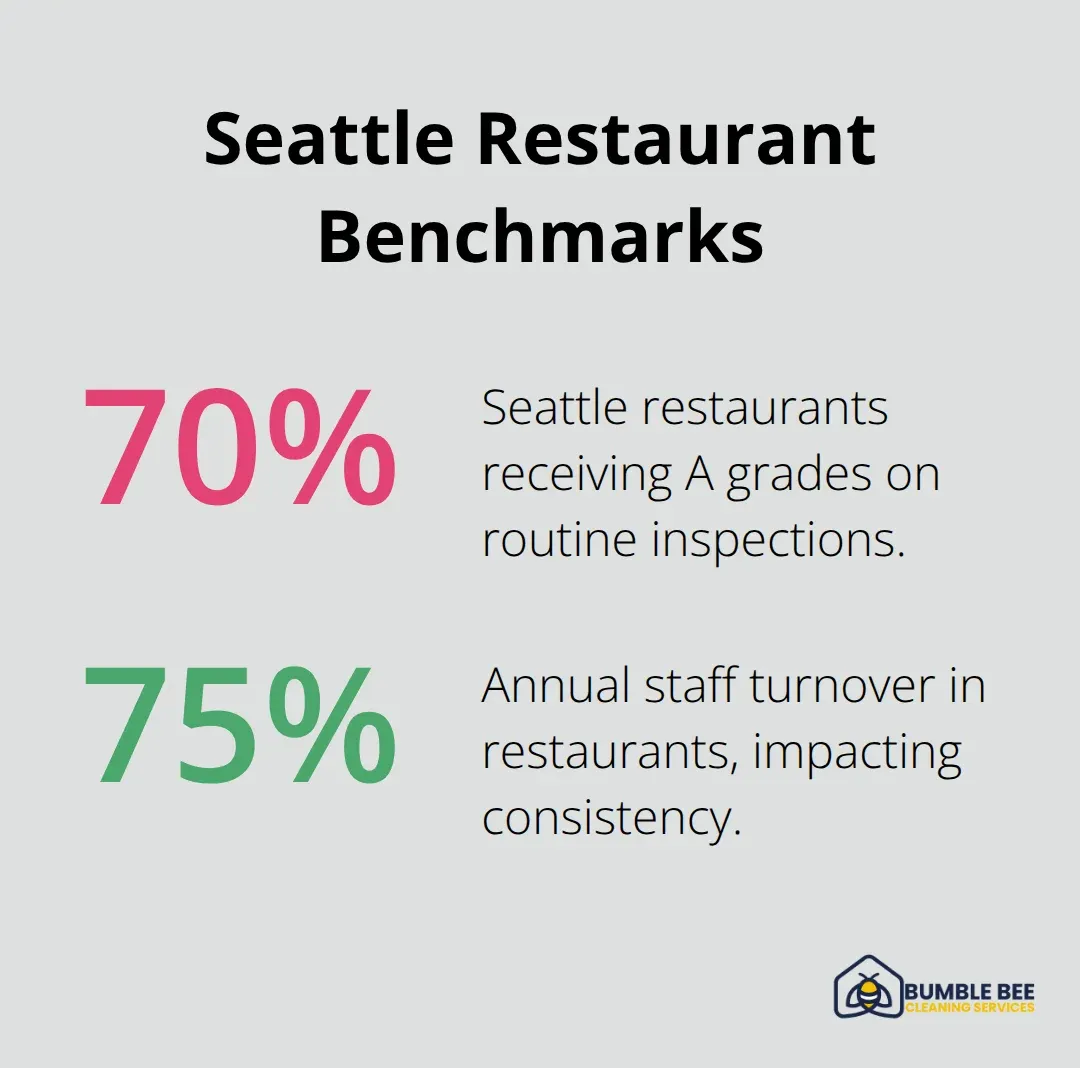Seattle’s restaurant scene thrives on exceptional food and spotless environments. Restaurant sanitation standards directly impact customer satisfaction and business success.
We at Bumble Bee Cleaning Services work with numerous Seattle establishments to maintain these high standards. The right cleaning approach makes the difference between passing inspections and facing costly violations.
What Daily Cleaning Tasks Keep Seattle Restaurants Spotless?
Kitchen Sanitization Requirements
Seattle restaurants follow strict cleaning schedules to meet Washington State Department of Health standards. Food contact surfaces need cleaning after each use, with sanitizing solutions that contain less than 100ppm chlorine. Kitchen equipment requires daily deep cleaning, which includes degreasing fryer hoods and sanitizing cutting boards with separate color-coded systems for raw meats and vegetables.
The Seattle Food Code mandates proper dishwashing temperatures for sanitization. Three-compartment sinks must maintain water temperatures above 110°F for washing. Staff clean prep surfaces immediately after food preparation and sanitize all equipment before storage.
Dining Room Maintenance Standards
Table turnover cleaning involves sanitizing surfaces within 30 seconds between customers. Staff use EPA-approved disinfectants on high-touch areas like condiment containers and menu holders. Payment terminals receive disinfection every two hours during operating hours.

Floors need sweeping after each service period and mopping with approved sanitizing solutions. Staff wipe down chairs, booth seating, and window sills during slower periods to maintain consistent cleanliness throughout service hours.
Restroom and High-Touch Surface Requirements
Seattle & King County Public Health requires restrooms to receive cleaning twice daily minimum. High-traffic establishments need hourly restroom checks to maintain standards. Door handles and light switches need disinfection every two hours during operating hours.
The King County Board of Health Code specifies that restroom supplies must receive continuous restocking. Floors require mopping with disinfectant solutions every four hours. Hand sanitizer stations must contain at least 60% alcohol content and staff refill them when they reach 25% capacity.
These daily cleaning tasks form the foundation for meeting Seattle’s health department standards, but restaurants must also navigate complex compliance requirements and inspection processes that determine their operational success.
How Do Seattle Restaurants Navigate Health Department Inspections?
Understanding Seattle-King County Health Requirements
Seattle & King County Public Health conducts routine inspections with over 70% of restaurants that receive an A grade. This grade indicates high sanitation levels across the city. The inspection process evaluates food handling, employee hygiene, and equipment maintenance against Washington State food code standards.
Restaurants face fines that average $1,000 for health code violations. This makes compliance financially essential for business operations. The department requires self-inspections between official visits, with documentation that proves continuous adherence to safety protocols.
Temperature logs for refrigeration units must show readings below 41°F. Hot holding equipment needs temperatures above 135°F that staff record hourly. These temperature requirements protect food safety and prevent bacterial growth.
Common Violations and Prevention Strategies
Cross-contamination prevention ranks as the top violation category. Foodborne illness outbreaks are frequently associated with retail food establishments. Staff must change gloves between tasks and wash hands before putting on new gloves.
Hand-washing station compliance failures occur when soap dispensers stay empty or water temperatures drop below 100°F. Inspectors check these stations first during visits. Staff must maintain water temperature logs and refill soap dispensers throughout each shift.
Food storage violations happen when raw meats sit above ready-to-eat foods in refrigerators. Proper storage requires raw proteins on bottom shelves with cooked foods above them. This simple arrangement prevents dangerous cross-contamination.
Documentation That Passes Inspections
Staff training records must document food safety education sessions. Seattle restaurants provide regular hygiene protocol reinforcement to 100% of their staff. These records prove that employees understand proper food handling procedures.
Temperature monitoring sheets, sanitizer test strip results, and employee health records form the documentation foundation that inspectors review. Digital tracking systems help restaurants maintain consistent record-keeping while preparing for unexpected health department visits.

Cleaning schedules must show completion times and staff signatures for each task. Inspectors look for gaps in documentation that might indicate missed cleaning procedures. Complete records demonstrate the restaurant’s commitment to maintaining health standards between official inspections.
Professional cleaning services often provide the expertise and consistency needed to meet these demanding documentation requirements while maintaining the operational focus that restaurants need for success.
Which Cleaning Approach Works Best for Seattle Restaurants
Professional Service Cost Advantages
Professional commercial cleaning services typically save businesses money compared to in-house cleaning staff by reducing labor costs and providing specialized equipment ownership, bulk supply purchases, and trained staff efficiency that individual restaurants cannot match.
In-house operations require restaurants to purchase commercial-grade equipment, sanitizers, and replacement parts. A single commercial floor scrubber costs $3,000, while professional services include this equipment in their service rates. Restaurants also face liability insurance increases when staff handle hazardous chemicals and operate heavy machinery.
Consistency Through Expert Training
Professional teams receive ARCSI and IICRC certification that covers Seattle’s specific health code requirements. Staff turnover in restaurants averages 75% annually (according to the National Restaurant Association), which creates gaps that affect quality. Professional services maintain consistent teams with specialized knowledge of restaurant sanitation protocols.

These certified technicians understand cross-contamination prevention and proper sanitizer dilution ratios. Teams follow documented procedures that meet Seattle & King County Public Health standards without restaurant management oversight.
Equipment and Chemical Expertise
Professional services use EPA-registered sanitizers with precise dilution systems that maintain effectiveness while they meet safety requirements. Restaurants often struggle with proper chemical ratios, which leads to either ineffective results or health code violations. Commercial-grade extraction equipment removes grease and food particles that standard mops cannot handle.
This approach prevents slip hazards and odor problems that affect customer experience. Temperature monitors and digital documentation systems help restaurants maintain the inspection-ready records that health departments require while staff focus on food service operations.
Final Thoughts
Restaurant sanitation success requires three fundamental strategies: daily protocols that meet Seattle’s health department standards, thorough documentation for inspections, and the right approach for your establishment. These elements create the foundation for long-term business success. Professional standards deliver measurable benefits beyond compliance.
The 70% of Seattle restaurants that receive A grades demonstrate how proper sanitation directly impacts customer trust and business reputation. Restaurants that invest in professional services avoid the average $1,000 fines for health code violations while they maintain consistent quality. This approach keeps customers satisfied and builds lasting relationships (which drives repeat business).
Seattle restaurant owners should evaluate their current operations against health department requirements and consider whether in-house staff can maintain the specialized knowledge needed for compliance. We at Bumble Bee Cleaning Services offer comprehensive commercial cleaning solutions with certified teams who understand Seattle’s specific health code requirements. Our experience helps restaurants maintain the spotless environments that drive customer satisfaction and business growth.
